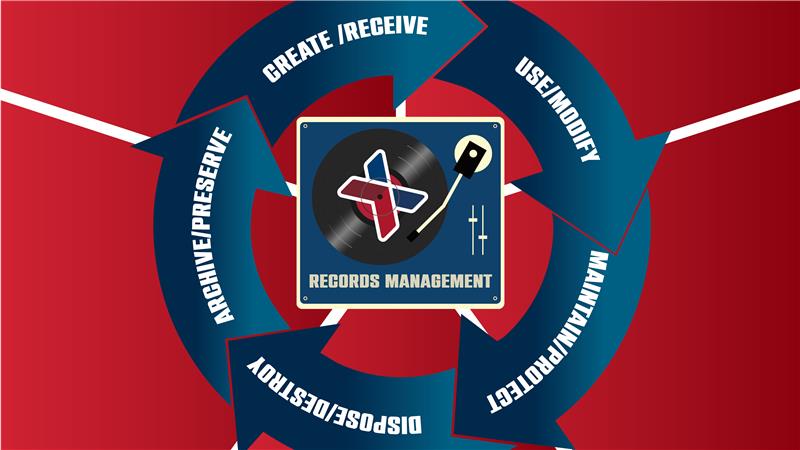When you hear the words records management, you might think of vinyl and vintage hits. At the Exchange, records management is all about keeping data in tune, and the Information Technology Directorate is the sound engineer behind the scenes.
What is the purpose of records management?
Records management is the process of managing records throughout their life cycle—from the moment they are created or received to their final disposition.
What qualifies as a record?
Any physical or digital item that documents a business transaction, authorization or decision critical to the Exchange mission must be managed accordingly. This includes emails, reports, policies, contracts, memos and more.
What is the disposition process?
In the final phase of the records management process, one of three things can happen: The record may be destroyed, deleted or permanently archived in the National Archives to preserve it (yes, even the musical records you initially thought about live there).
Why should I care about records management?
Because it affects everyone and safeguards the Exchange mission of mission-essential service. From in-store associates to HQ teams, records management prevents data loss and missed deadlines, protects sensitive information and improves operational efficiency by reducing errors.
I have a record, what should I do?
Associates should follow the Exchange’s records management policy and retention schedule. These guidelines outline how long to keep a record, where to store it and how or when to dispose of it. You can find the policy and retention schedule here.
How do I know that my records management efforts are worth it?
Like any effective organizational strategy, records management empowers associates to locate information faster; enhances compliance and audit readiness; and can increase productivity by more than 20%. It helps the Exchange identify and clean up outdated databases, and respond swiftly to audits, legal inquiries and Freedom of Information Act (FOIA) requests—resulting in cost savings and reduced risk. Ultimately, it helps us work smarter, move faster and safeguard our most critical assets.
True or False:
“Cloud storage does the heavy lifting and safely stores my Exchange documents, so I don’t need to worry about records management.”
- False: Only authorized and compliant cloud platforms are equipped to effectively store and safeguard Exchange records.
“Records Management is the responsibility of the General Counsel and/or Compliance.”
- False: “Records management is everyone’s responsibility,” said Exchange IT Policy and Planning Manager Tom Giangreco II. “Knowing what qualifies as a record, adhering to management policies and following retention schedules allow our team to uphold compliance, support operational continuity and protect the Exchange’s legal and financial standing.”
“Technically, emails aren’t records, so there’s no need to include them in the records management process.”
- False: If an email documents a business decision, transaction or obligation, it is considered a record and must adhere to the Exchange Records Management policy.
“Many of the Exchange’s official records are digital.”
- True: Many records are in our inbox as emails contain documentation of business decisions.




Leave a Reply